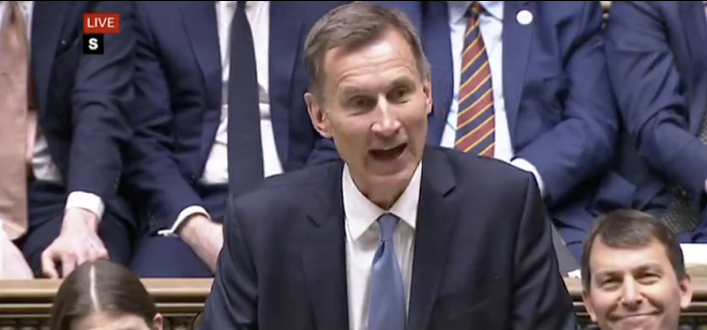Chancellor Jeremy Hunt’s Budget measures on fuel and energy costs will farmers and rural businesses, but he has not gone far enough, according to industry exports.
Mr Hunt announced that fuel duty will be frozen at a reduced rate for a further year, while the Energy Price Guarantee has been extended extra three months until June.
Chris Walsh, Farm Specialist at NFU Mutual, said: “We’re pleased to see the Chancellor freeze fuel duty at its reduced rate for another year.
“Farmers and rural communities rely more heavily on fuel than their urban counterparts, whether that is using red diesel for agricultural work, or white diesel and petrol for transporting produce around the countryside.
“The £200 million fund announced to repair damaged roads may help fix potholes which are seriously affecting those driving on rural roads.
“It was also welcome news to see the energy price guarantee extended for three months, as households in rural areas had a higher fuel poverty rate (15.9%) last year than those in towns and cities and rural households are on average, less energy efficient.”
Energy relief opportunity missed
However, NFU Scotland President Martin Kennedy said NFUS was ‘deeply disappointed’ that, despite the strongest representation from all parts of the UK, the budget has not been used as a platform to extend the highest level of energy relief available under the Energy and Trade Intensive Energy Scheme to key agricultural sectors after March 31.
“NFU Scotland has been lobbying for horticulture, poultry and pig production to be included in the ETII Scheme,” he said.
The four UK farming unions also wrote jointly to the Department for Energy Security and Net Zero (DESNEZ) highlighting that unless the scheme is amended to provide a higher level of relief, there could be a reduction in domestic food production.
“That risks longer running food price inflation for consumers and could also negatively impact the thousands of supply chain companies that are sustained by the farming sector,” Mr Kennedy said.
From April 2023, the ETII scheme will provide high level energy relief to several sectors including food processing and manufacturing. However, it currently excludes primary agricultural production.
“Instead, when the Energy Bill Relief Scheme changes at the end of March, many food producing businesses will struggle to absorb the huge hikes in energy prices, leaving them to face an energy cost cliff edge,” Mr Kennedy added.
“NFU Scotland has raised the matter in person with MPs in recent weeks, including at its meeting with Under Secretary of State for Scotland John Lamont MP on Friday, and we will continue to lobby for these industries to be properly recognised under ETII.”
Lack of ambition
Mark Tufnell, president of the Country Land and Business Association (CLA) was far from impressed with Mr Hunt’s Budget.
“After 12 years in charge, it is still difficult to see what – if any – ambition the government has for the rural economy. Rural businesses continue to be held back by apathy in public policy, not least in the planning system that actively holds back entrepreneurs from generating growth,” he said.
“The rural economy is 19% less productive than the national average. Closing this gap would add £43bn to the national economy. Nothing in this budget will unlock that vast potential.”
But he welcomed a potential change, following a consultation, to the definition of agriculture to include environmental delivery for IHT purposes.
“The CLA has campaigned extensively to change the definition of agriculture in the tax system to include ecosystem services. It is vital to give farmers and landowners the confidence they need to engage with environmental delivery, improving biodiversity and carbon sequestration.”
He suggested the change would also serve to encourage farmers to look afresh at entering into Environmental Land Management schemes (ELM).
SOL disappointment
The Association of Independent Meat Suppliers (AIMS) has expressed disappointment that the Government has still not added butchers to the shortage occupation list (SOL), a move that would make it easier for meat companies to fulfil their labour needs.
As a result of today’s budget, AIMS has written to Food and Farming Minister, Mark Spencer, asking for immediate action in order that their members can help contribute for fully to the desired economic growth his Government is wanting.
AIMS highlighted a statement in the Red Book, which accompanies the budget statement
that the government will ‘ensure that the UK labour market has access to skills and talent from abroad where needed’.
But while the Government will accept the Migration Advisory Committee’s (MAC) interim recommendations to add five construction occupations to the Shortage Occupation List (SOL) initially, ahead of its wider SOL review concluding in autumn 2023, there is no such promise on butchers.
“Given that the previous MAC recommendation in September 2020 was to list butchers as a shortage occupation, a recommendation which was subsequently blocked by the Home Office, we will be asking that same easement for construction be granted to meat and poultry processors to help ease the immediate labour supply pressures that members are facing and to enable them to contribute to the country’s drive for economic growth,” said Tony Goodger from AIMS.




